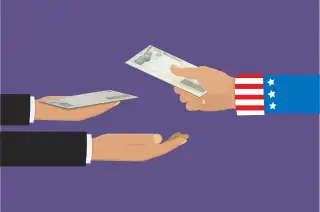Are Cities the Source of Your Next Stimulus Check?

As the economic shutdown bleeds into a new month, Americans from every corner of the country are holding onto hope that more government aid is on the way.
The first round, which included $1,200 stimulus checks doled out to most taxpayers, didn't go far for most people — particularly the tens of millions (and counting) who have joined the ranks of the unemployed in recent weeks, and are struggling to stay afloat amid the coronavirus pandemic.
And while White House advisors say they're looking into the possibility of sending out additional stimulus checks, no concrete moves have been made.
Now, as a sort of short term band-aid, some local governments are redirecting the CARES Act money they received into additional stimulus checks for their residents.
Does this mean you can expect another check in the mail from our local governments? Here's everything we know so far.
Will I get a second stimulus check?
State representatives have floated the idea of sending out more stimulus money in various forms, but it's unclear whether any of those will come to fruition.
Congressional democrats like Rep. Alexandria Ocasio-Cortez and Sen. Kamala Harris have advocated for recurring monthly payments as “the most efficient mechanism for delivering economic relief to those most at-risk in this crisis.” And on April 14, representatives from California and Ohio introduced an act designed to provide $2,000 monthly payments to every qualifying American for up to a year.
President Donald Trump hasn't shot down the possibility of additional government aid, saying in an April 6th press conference that a second round of stimulus checks is "absolutely under serious consideration."
In the meantime, state and local governments are having to deal with mass job and income losses any way they can. And in recent weeks, some have announced hopes to distribute additional stimulus checks to local residents themselves.
Which parts of the country will benefit?
So far, not many. But at least one city — Jacksonville, Fla. — has agreed to provide additional stimulus checks to residents. Others say they're researching the possibility.
On April 23, Mayor Lenny Curry announced that Jacksonville is offering $1,000 to residents who make less than $75,000 a year, and who lost at least 25% of their income to the COVID-19 crisis.
The money will be provided on a first-come, first-serve basis to 40,000 households in Duval County, Fla., according to WJXT, a Jacksonville news station.
In Montgomery County, Texas, Commissioner James Noack is lobbying for a portion of the county's CARES Act funds to be funneled into stimulus checks for residents. The amount of each check would be based on a percentage of last year’s county property taxes, Noack said in a press release.
"These federal funds are not a gift to Montgomery taxpayers," he said. "These are their dollars; and the best use of these funds is to put them back in their hands."
What are other cities and states doing?
In other parts of the country, politicians are directing CARES Act funding towards specific segments of the population.
These aren't wide-sweeping stimulus checks, but rather, a more targeted approach to lift up their most vulnerable populations.
In Madison, Connecticut, public officials have set aside $250,000 worth of financial support for people who are experiencing financial hardships as a result of mandatory isolation, Madison.com reports.
Officials in Los Angeles county plan to use much of the $20 million in government assistance the county received from the CARES Act to help low-income residents pay their bills.
"The need far exceeds what Washington is sending," L.A. Country Supervisor Kathryn Barger told a local NBC affiliate. "I think this is a good start."
More From Money:
All the Ways You Could Benefit From the Coronavirus Stimulus Package